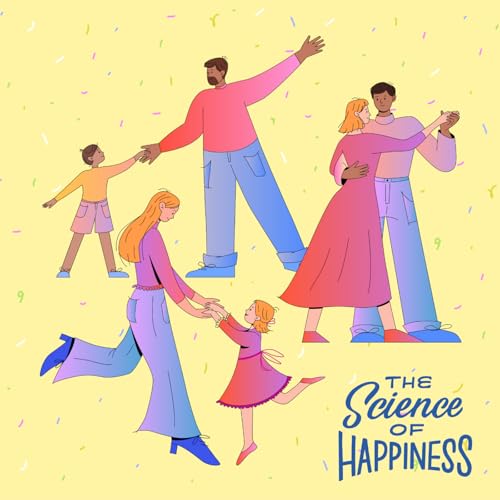
What Happens When Caregivers Dance
No se pudo agregar al carrito
Add to Cart failed.
Error al Agregar a Lista de Deseos.
Error al eliminar de la lista de deseos.
Error al añadir a tu biblioteca
Error al seguir el podcast
Error al dejar de seguir el podcast
-
Narrado por:
-
De:
Even just a few minutes of dancing can shift energy, release emotions, and remind us to care for ourselves while we care for others.
Summary: Dance isn’t just fun—it’s scientifically shown to make us happier, ease stress, and strengthen social bonds. From swaying in the kitchen to joining a community class, movement helps us regulate our nervous systems and reconnect with joy. In this episode of The Science of Happiness, we explore what the science says about how dancing supports well-being for parents, caregivers, and families.
How To Do This Practice:
- Pick a Song You Love: Choose music that makes you want to move. Even if it’s just a little sway. It could be something upbeat or a song from your childhood that feels comforting.
- Start Small: Give yourself permission to move for just five minutes. No pressure to “work out”—the goal is to shift your energy and lift your mood.
- Follow Your Body: Sway, step, shake, or spin. There’s no right or wrong way. Let your body lead instead of worrying about looking a certain way.
- Play with Pausing: Try stopping mid-song for a “freeze” moment, then move again. Pausing helps build awareness, self-control, and a sense of play.
- Invite Connection: If you have kids, family, or friends around, pull them into the movement. Science shows that dancing together strengthens bonds and amplifies joy.
- Release and Reset: Notice how you feel after moving— lighter, calmer, maybe more grounded. Let dance be a way to release tension and return to your day with more energy.
Scroll down for a transcription of this episode.
Today’s Guests:
MAGDALENE MARTINEZ is a licensed clinical social worker who works with children, teens and adults.
Learn more about Magdalene here: https://www.oceandustwellness.com/
DR. ÖZGE UGURLU is a behavioral scientist in the social interaction lab at UC Berkeley. Her research centers on emotions, self-control, and child development.
Add Dr. Ugurlu on Linkedin here: https://www.linkedin.com/in/ozge-ugurlu
Related The Science of Happiness episodes:
Caring for Caregivers Series: https://tinyurl.com/4k2hv47j
Our Caring for Caregivers series is supported by the Van Leer Foundation, an independent Dutch organization working globally to foster inclusive societies where all children and communities can flourish.
To discover more insights from Van Leer Foundation and others on this topic, visit Early Childhood Matters, the leading platform for advancing topics on early childhood development and connecting diverse voices and ideas across disciplines that support the wellbeing of babies, toddlers and caregivers around the globe.
Tell us about your experience with this practice. Email us at happinesspod@berkeley.edu or follow on Instagram @HappinessPod.
Help us share The Science of Happiness! Leave us a 5-star review on Apple Podcasts and share this link with someone who might like the show: https://tinyurl.com/2p9h5aap
Transcription to come.


